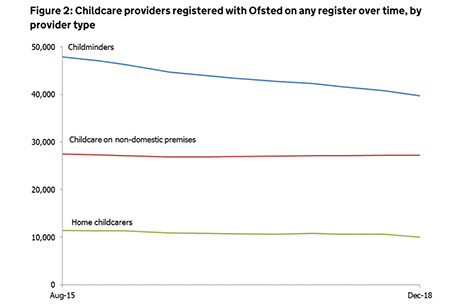
Meanwhile the number of nurseries was down by around 50 during the same time period.
The figures also show that 95 per cent of providers on the Early Years Register are judged good or outstanding.
The number of new childminders joining the sector was also much lower between 31 August and December 2018 than it has been over the same time period during the previous three years.
For example, in 2017 there were 1,400 new childminders that joined between August and December, double the number for the same period in 2018 (700).
The Professional Association for Childcare and Early Years (PACEY) is so concerned that it has commissioned the Plymouth Institute of Education at the University of Plymouth to identify what is causing the fall in numbers in England and Wales and possible solutions.
The research will involve a survey with local authorities and case studies, with the final report due to be published early next year.
Overall, the number of childcare providers has been falling steadily since August 2015, mainly due to a large decrease in childminder numbers.
The latest Ofsted figures on childcare providers and inspections as at 31 December 2018, reveal that were 39,700 childminders registered with Ofsted on 31 December 2018, down by 1,000 (3 per cent) since 31 August 2018, and by 8,200 (17 per cent) since the introduction of the common inspection framework (CIF) on 1 September 2015.
The number of childminders has been declining over the past six years, with a drop in England of 29 per cent since 2012, and in Wales, a fall of nearly a quarter since 2014 (2018 figures).

Source: Childcare providers and inspections as at 31 December 2018, Ofsted
Liz Bayram, chief executive of PACEY, said, ‘We have lost another thousand childminders in England at a time when demand for childcare has never been higher, and childminding should be thriving. The continued drop in registered childminders is a major concern for PACEY, so much so that we have now commissioned a team of researchers at University of Plymouth to identify what is causing this decline and, in particular, why fewer people are choosing childminding as a career. Its findings will inform both PACEY’s future plans and its policy goals.
‘We know people will not continue to childmind forever, with most doing so for between five- 10 years. The challenge is how to encourage new entrants to replace those who are leaving.
‘Childminding makes a unique contribution to the childcare market and its continued to decline will have a negative impact for children and families.’
PACEY said the decision to end the childcare business grant for childminders has also had a negative impact as well as ongoing registration delays at Ofsted, as well as more ‘fundamental issues’ such as sustainable funding and the fact childminders cannot claim funding for related children.
Childcare places
While the figures highlight the decline in the number of childminders, the number of places offered by childminders has only decreased by 6 per cent because each childminder is offering a higher number of places on average, which was 6.4 at the end of December.
This takes into account childminders with assistants who are allowed to offer more than six places.
While childminder places decreased between August and December 2018, there was a larger increase in the number of places offered by childcare on non-domestic premises.
This meant that the overall number of places increased by 2,100 (less than 1 per cent) since August 2018.
Meanwhile, the overall number of childcare places on the Early Years Register has remained fairly stable since 2015.
On 31 December 2018 there were 1.3 million childcare places offered by providers on the Early Years Register.
There were 27,200 providers on 31 December 2018, down by fewer than 50 providers since August 2018.
Numbers are fairly stable over time, having decreased by just 1 per cent since August 2015.
Commenting on the figures, Neil Leitch, chief executive of the Early Years Alliance, said, ‘While today’s figures show that nurseries, pre-schools and childminders continue to deliver quality early education, the woeful underfunding of the early years sector is taking its toll on dedicated and passionate practitioners.
‘Ongoing research by the Early Years Alliance shows a stressed, unappreciated and underpaid workforce so it is no surprise that Ofsted found childminder numbers are continuing to fall by 3 per cent (1,000) in just one quarter. Saying this, over 9 in 10 settings are achieving Good and Outstanding ratings which is a testament to settings and the committed practitioners who continue to educate our youngest children.’
Minister for children and families Nadhim Zahawi said, 'It’s fantastic to see 95% of childcare providers are rated good or outstanding by Ofsted – more than ever before, and up from 68 per cent in 2010.
'This improvement is testament to our committed early years staff who are pivotal to this increasing quality and ensure pre-school children get a great start to their education.
'We are investing more in childcare than ever before, so that more children benefit from an early education that puts them on track to succeed in life.'
